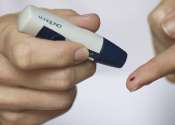Machine-learning algorithms used to detect Alzheimer's during phone conversations
Researchers working at the Department of Public Health, McCann Healthcare Worldwide Japan Inc., has created three algorithms that can be used to detect Alzheimer's in patients as they engage in phone conversations. The group ...









